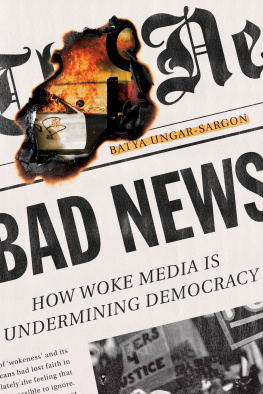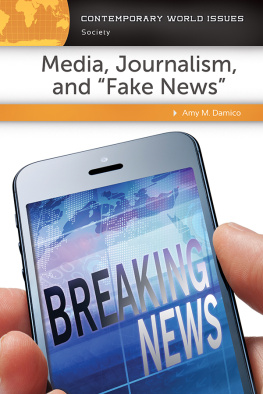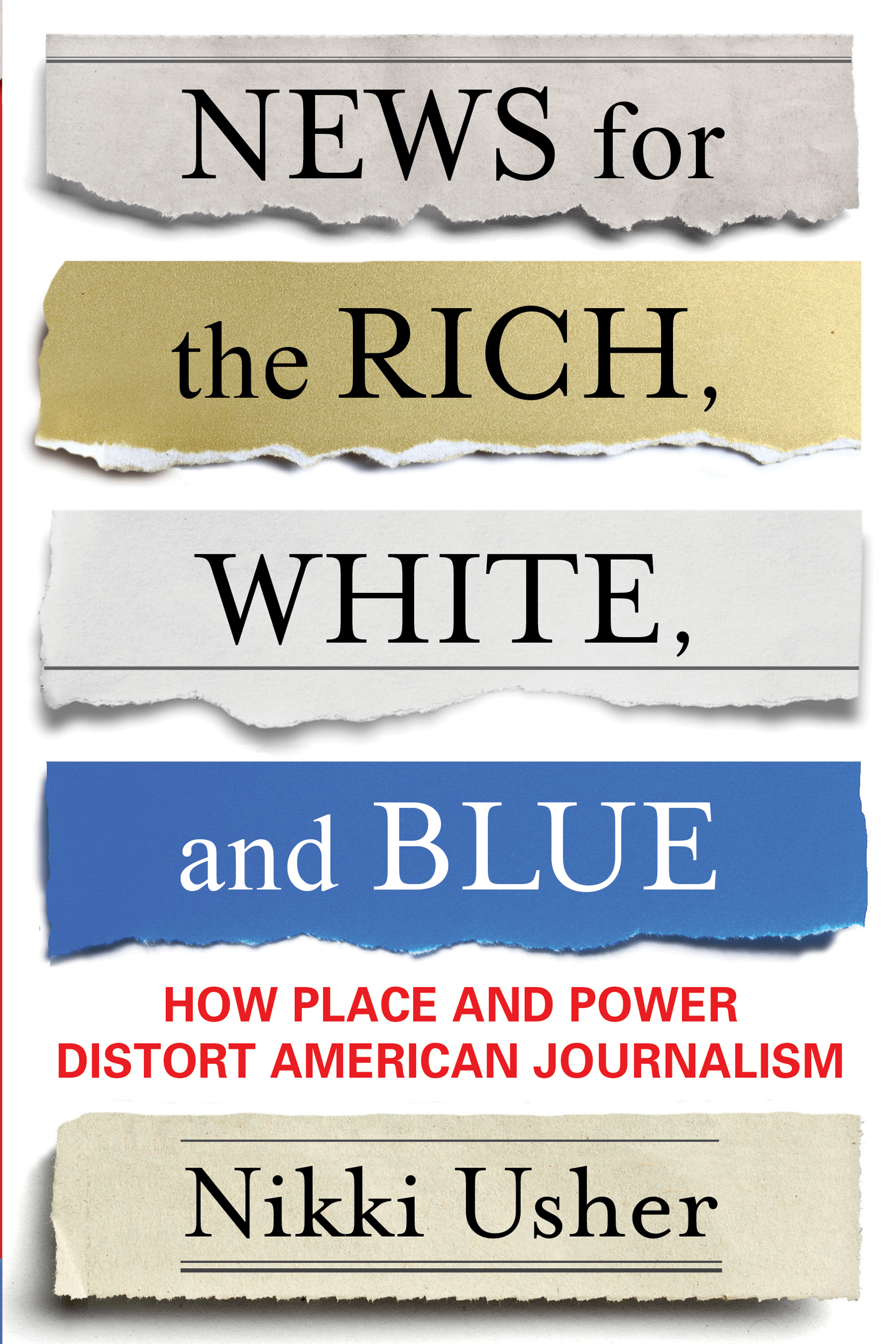Contents
Guide
Pagebreaks of the print version
NEWS FOR THE RICH, WHITE, AND BLUE
News for the Rich, White, and Blue
How Place and Power Distort American Journalism
Nikki Usher
Columbia University PressNew York
publication supported by a grant from The Community Foundation for Greater New Haven as part of the Urban Haven Project

Columbia University Press
Publishers Since 1893
New YorkChichester, West Sussex
cup.columbia.edu
Copyright 2021 Columbia University Press
All rights reserved
E-ISBN 978-0-231-54560-0
Library of Congress Cataloging-in-Publication Data
Names: Usher, Nikki, author.
Title: News for the rich, white, and blue : how place and power distort American journalism / Nikki Usher.
Description: New York : Columbia University Press, 2021. | Includes bibliographical references and index.
Identifiers: LCCN 2020053469 (print) | LCCN 2020053470 (ebook) | ISBN 9780231184663 (hardback) | ISBN 9780231184670 (trade paperback)
Subjects: LCSH: JournalismPolitical aspectsUnited StatesHistory21st century. | Online journalismPolitical aspectsUnited StatesHistory21st century. | JournalismObjectivityUnited StatesHistory21st century. | JournalismEconomic aspectsUnited StatesHistory21st century. | Newspaper publishingEconomic aspectsUnited StatesHistory21st century.
Classification: LCC PN4888.P6 U84 2021 (print) | LCC PN4888.P6 (ebook) | DDC 070.4/49320973dc23
LC record available at https://lccn.loc.gov/2020053469
LC ebook record available at https://lccn.loc.gov/2020053470
A Columbia University Press E-book.
CUP would be pleased to hear about your reading experience with this e-book at .
Cover design: Noah Arlow
Cover images: Shutterstock, Dreamstime
To Brinton Henry Layser
Contents
When I was a cub reporter at the Philadelphia Inquirer, I was stuck out in the suburbs of southern New Jersey. Union regulations put strict boundaries on my movement: I wasnt allowed to work from the gleaming newsroom headquarters in Philadelphia. If I did end up reporting a story in the city, I would have to be paid more. That downtown building was like a beacon, the so-called Tower of Truth, with a gleaming marble entryway and a golden dome that could be seen from most of the city. All I wanted was to work inside the building, but I think I wanted it too much. Youthful impatience and ego got the better of me, and I left a reporting career behind for graduate school and the academy. The building had functioned as my gatekeeper; the newsroom was a place of power. From inside, journalists could hold Philadelphias corrupt officials accountable and chronicle the joy and frustrations of a city united by rabid sports fans and divided by glaring inequalities.
In 2012, when I learned that the Philadelphia Inquirer was moving out of its historic headquarters, I felt a visceral mix of sadness, pain, and shock. Though my academic career had to this point largely celebrated the forward progress of journalists adapting to new technology, this idea of newsrooms moving from their established place in a city became a symbol of the decay of the newspaper industry. Thanks to a fellowship at the Tow Center for Digital Journalism at Columbia University, I began looking at what would become a routine move to shed newspaper debt: the sale of landmark historical buildings and relocation to smaller, more digitally functional quarters. When the contract for this book was signed in 2015, the book was supposed to be about news buildings, journalism in the built environment, newspaper manufacturing, and postindustrial spaces and places of news.
But in fall 2016, following the U.S. presidential election, I saw that I had been thinking far too narrowly about place. The book took a sharp turn as I became increasingly angry at the news industry as a whole: so many of its wounds were self-inflicted. Other wounds, of course, were not, from the long-term right-wing media strategy to undermine mainstream media, to changes in audience preferences, to the rise of big tech. Like many journalists, scholars, industry observers, and policy makers, I was frustrated by the blind spots of national journalists whose media bubble insulated them from the groundswell of right-wing populism in the United States. It became clear to me that place, partisanship, and inequality were increasingly intersecting when it came to how people felt about news and where journalism seemed to be on the decline.
It was disturbing to me to see cut after cut to the kind of journalism that had long held people in power accountable and provided a first draft for the cultural memory about a place. The situation seemed to be the worst at newspapers, especially the type of large newspaper I had worked at in some capacity: the Boston Globe, the Dallas Morning News, the Times-Picayune, the Chicago Tribune, the LA Times, and the Philadelphia Inquirer. The consequences of losing the news would have significant consequences for a city, state, and region. What had happened to these places of power?
At the same time, I understood well that these newsrooms had long histories of racism, homophobia, and elitism that had affected who could and could not be a journalist and what stories could and could not be written. When I was working as a young queer journalist, my editors would second-guess my ability to objectively cover any story I suggested about the LGBTQ community. With all the good that this journalism was supposed to bring to democratic life, it often fell short.
National journalism seems increasingly likely to dominate what limited attention audiences have for journalism. But different places have different resources, opportunities, limitations, histories, and power structures, and national journalism cannot tell these stories as well or as often as local news media. As American political power is tied to geography, this presents a serious problem for democratic life. When I moved from Washington, DC, to Champaign-Urbana, Illinois, in 2018, this question of place became personal. I live within walking distance of farmland and am now just a few miles from rural America. My new local newspaper is an all-white institution that cozies up to the local establishment and has serious problems covering race.
This is an academic book because I am an academic, but it is not intended only for academic audiences. Nonacademics reading this book might find the quantitative analysis in challenging, while academics might want more information on the methods. Ive provided significant context in the appendixes and notes. For a more robust theoretical discussion of this books core concepts, please see my Putting Place in the Center of Journalism Research: A Way Forward to Understand Challenges to Trust and Knowledge in News, Journalism & Communication Monographs 21, no. 2 (2019): 84146. As a caveat for all readers, peoples titles are consistent with what they were at the time of the research. Most of the journalists and industry insiders mentioned by name have offered their responses to my interpretations of their work or their thoughts, and you will see this reflected either in the text or in footnotes.
Over the course of the writing and the production of this book, a global pandemic and two U.S. presidential elections have occurred. The pandemic has kept journalists in their homes, forcing a form of disconnected journalism where remote visits to people and places stand in for on-the-ground knowledge, and the consequences of COVID-19 for journalisms economic fortunes are likely to be felt as long-haul challenges. Clearly, the news industry is changing rapidly. To keep up is like chasing a speeding bullet; that said, the arguments made here endure past any one particular event or headline. Nonetheless, we still have a choice: everyone reading this book has the opportunity to rethink how to make the American news media more equitable and more responsive to the needs of democratic civic life, especially at the local level.







